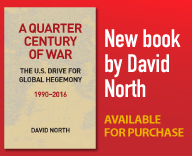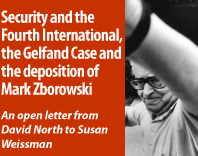Socialism and the struggle against war
4 May 2015
This perspective is the text of the speech delivered by David North, chairman of the World Socialist Web Site International Editorial Board and national chairman of the Socialist Equality Party (US), to open the May 3 International May Day Online Rally.
On behalf of the International Committee of the Fourth International and the World Socialist Web Site, permit me to extend fraternal greetings to the many listeners all over the world, in more than 60 countries, who are participating in this Online Celebration of May Day 2015.
The purpose of this rally is threefold:
First, to give voice to the opposition of the international working class to the relentless escalation of military violence that, unless stopped, threatens to engulf the entire world in a catastrophe of unimaginable dimensions.
Second, to provide an analysis of the main causes and dynamics—economic, geopolitical and social—of the global crisis that is the driving force behind the militaristic policies being pursued by imperialist and capitalist governments all over the world.
Third, to outline the political principles and program upon which a new revolutionary movement of the international working class against war must be based.
One year ago, the International Committee held its first Online May Day rally. At that time, it warned that the policies being pursued by the imperialist powers—with the United States in the lead—were laying the foundations for a third world war. The events of the past twelve months have substantiated these warnings.
The past year has witnessed the relentless escalation of military violence, instigated by the United States and its major imperialist allies. The so-called “War on Terror” expands from country to country, from continent to continent. Nearly fifteen years after the events of 9/11, it has become obvious to all but the blind that the “War on Terror” has served as a pretext for the unleashing of US military power all over the world.
The US invasions of Afghanistan in 2001 and Iraq in 2003 were merely the opening rounds of bloody military operations in the Middle East, North Africa and Central Asia—involving either the direct intervention of American military forces or US-sponsored mercenaries—that have, during the past decade, led to the deaths of hundreds of thousands of people. The outcome of these operations has been the physical and social devastation of Iraq, Afghanistan, Syria, Yemen and Libya. The refugees who have drowned in the Mediterranean, off the coast of Libya, are among the countless victims of the criminal policies pursued by US and European imperialism.
The events of the past year have made it all too clear that these regional interventions are part of an emerging global battle plan. The United States is escalating, simultaneously, its confrontation with Russia and China. With extraordinary recklessness, the Obama administration has taken actions that seem calculated to provoke a Russian military response. The US orchestration of the Ukrainian coup in February 2014 initiated a confrontation with a nuclear-armed Russia. Far from seeking to pull back from the brink, the United States—with the support of Germany and other NATO powers—is intensifying economic and military pressure against Russia.
It is a well-established historical fact that the existence of a complex network of military alliances and commitments between different European states—whose political implications and consequences were poorly understood by the governments involved, and which were hidden from the great mass of the people—contributed significantly to the outbreak of World War I in July–August 1914. Without the “Blank Check” that it had received from Germany in July 1914, the Austro-Hungarian government might have refrained from going to war against Serbia two weeks later. The commitments made by France to Russia encouraged the Tsarist regime to intervene militarily in support of Serbia.
One hundred years later, history is repeating itself. During his visit last year to Tallinn, capital of the small Baltic state of Estonia, Obama declared in a public speech:
I say to the people of Estonia and the people of the Baltics, today we are bound by our treaty Alliance. We have a solemn duty to each other. Article 5 is crystal clear: An attack on one is an attack on all. So if, in such a moment, you ever ask again, “who will come to help,” you’ll know the answer—the NATO Alliance, including the Armed Forces of the United States of America, “right here, [at] present, now!” We’ll be here for Estonia. We will be here for Latvia. We will be here for Lithuania.
How many Americans know about, let alone understand the implications of, the military commitment made by the Obama administration to the politically unstable and reckless right-wing government in Estonia? The distance between Tallinn in Estonia and St. Petersburg in Russia is just 230 miles, ten miles less than the distance between New York City and Washington, DC. Approximately one-quarter of the Estonian population consists of ethnic Russians.
Against the backdrop of the conflict in Ukraine, on-going tensions between Russia and Poland, and the relentless expansion of NATO throughout Eastern Europe and into the Black Sea region, is it so difficult to imagine that Russia might interpret Obama’s speech in Tallinn as the equivalent of a “Blank Check” to the Baltic regimes? Moreover, if Obama really meant what he said—and one must assume that he did—the United States and its NATO allies will go to war—and, quite possibly, nuclear war—against Russia in support of the Baltic states.
On the other side of the Eurasian landmass, the strategists of US imperialism are relentlessly pursuing their goal of encircling China. The “Pivot to Asia”—which other speakers will examine in greater detail—is nothing other than a code name for the systematic preparation for war against China. In a major examination of US policy vis-à-vis China, published in March of this year, the authoritative Council on Foreign Relations bluntly declared that “there is no real prospect of building fundamental trust, ‘peaceful coexistence,’ ‘mutual understanding,’ a strategic partnership, or a ‘new type of major country relations’ between the United States and China.”
The United States, the report declares, must, therefore, develop “the political will” and military capabilities “to deal with China to protect vital U.S. interests.” Those at the highest level of US policy-making have come, it appears, to view war with China as inevitable.
The emergence of such a strategic outlook, as a study of the previous world wars confirms, may become yet another contributing factor to the outbreak of a military cataclysm. “Once war is assumed to be unavoidable,” a historian of World War I has recently written, “the calculus of leaders and militaries change. The question is no longer whether there will or should be war, but when the war can be fought most advantageously.” (The Next Great War? The Roots of World War I and the Risk of U.S.-China Conflict, ed. Richard N. Rosencrance and Steven E. Miller, p. xi.)
It is well known that fundamental geo-political and economic interests drive the aggressive character of US policy in relation to China. The American ruling elite views the growing economic power of China as a threat to its own dominant position in Asia and throughout the world. Moreover, as a consequence of decades of economic stagnation and the decay of its industrial and manufacturing infrastructure, the ruling class is convinced that it is only through the naked exercise of military force that the global hegemony of American imperialism can be sustained.
To these international factors must be added the impact of the internal crisis of the United States, which is riven by intense social contradictions for which American capitalism has no progressive answer. The American political system has degenerated into little more than a facilitating mechanism for the plundering of society in the interests of a parasitical, endlessly self-absorbed, and essentially criminal financial elite. Among the central purposes of the never-ending “War on Terror” is the cultivation of fear and paranoia to distract the great mass of the American people from the real domestic causes of their social distress.
Washington is, without question, the political nerve center of imperialist violence throughout the world. But, in the final analysis, the policies pursued by the US government are a response to the crisis of the global capitalist system. The two essential elements of this crisis are 1) the anarchic character of an economic system based on private ownership of the means of production; and 2) the impossibility of restructuring and utilizing, in a socially progressive manner, the vast productive capacities of a globally-interconnected economy within the existing framework of the capitalist nation-state system.
The involvement of an ever-greater number of imperialist and capitalist powers in the struggle for economic markets and geopolitical influence testifies to the global character of the crisis. All the old capitalist powers are reviving their colonial ambitions, even to the extent of falsifying history to cover up their past crimes. Influential German professors are providing excuses for the wars launched by the Nazis. The Australian prime minister celebrates the horrific waste of thousands of young lives at Gallipoli in 1915, and glorifies that slaughterhouse as an exemplar of future sacrifices.
Every capitalist government, whatever its conflicting interests and motivations, is playing a reactionary role in the unfolding global crisis. The attempts by Russia and China to counter the pressure of American, European and Japanese imperialism by accelerating their own military programs, while at the same time inciting and appealing to national chauvinism, have not the slightest progressive content.
Vladimir Putin’s claim that Russia’s arsenal of nuclear weapons will defend the country against external threats combines strategic bankruptcy with the most extreme national fatalism. China’s massive increase in military expenditures will bring neither security nor peace. Its military spending is cited by the United States, Japan and other Pacific and Indian Ocean powers to justify their own build-up of military forces in the region.
The International Committee of the Fourth International is irreconcilably hostile to all the contending national powers. We base our opposition to imperialism on the principles of socialist internationalism. In our fight against war, we turn not to any national government, but to the international working class. The only effective antidote to the war between nations is the unfettered development, on the basis of socialist internationalism, of the conscious struggle of the working class for the overthrow of the capitalist system.
I suspect that there are, among our worldwide audience, those who, though in sympathy with our aspirations, find it difficult to cast off their skepticism toward the viability of the internationalist program advanced by the International Committee. The refutation of skepticism is to be found in an objective analysis of the global capitalist crisis and in the lessons of history.
The malignant spread of military violence—which threatens to metastasize fatally into a global war between nuclear-armed powers—reflects the ever-more desperate efforts of the ruling elites to contain, within the framework of existing property relations and the national-state system, the systemic crisis of world capitalism. However, it is this very same crisis that drives the international working class into revolutionary struggle—to resolve this crisis by abolishing capitalist ownership of the means of production and the nation-state system itself.
Exactly one hundred years ago, in May 1915, Leon Trotsky wrote an article entitled “Imperialism and the National Idea,” in which he analyzed the historical implications and significance of the First World War:
Destroying the very foundations of the economy, the current imperialist war, illuminating and amplifying the spiritual wretchedness or charlatanry of the national idea, is the most convincing expression of the blind alley that development of bourgeois society has led to. It is only socialism … that emancipates the world economy from national fetters, thus emancipating national culture from the grip of economic competition between nations—only socialism provides a way out of the contradictions that have broken out before us as a terrible threat to the whole of human culture.
Several months later, in September 1915, in the darkest hours of the First World War, 38 socialists met in the tiny Swiss village of Zimmerwald to debate a program and strategy to guide the opposition to war. Only 38 people! And of these 38 socialists, Lenin’s delegation consisted of just five. The Bolshevik Party, led by Lenin, was still a very small organization. But Lenin’s appraisal of the political implications of the war was immensely far-sighted. Like Trotsky, Lenin insisted that the war was not an unfortunate and temporary departure from a stable equilibrium that would be reestablished, more or less as it was before August 1914, once the fighting stopped. The war represented the breakdown of the old world capitalist order.
The essential strategic conception advanced by Lenin was that the same contradictions that had led to the outbreak of the World War would also lead to world socialist revolution.
The central task of Marxists was to prepare—through their theoretical, political and practical-organizational work—for the uprising of the world working class against capitalism and imperialism. Above all, the fight against war had to be based on uncompromising socialist internationalism. This required the building of a new revolutionary international party in opposition to the opportunist Second International that had capitulated to imperialism and supported the war. In 1915 Lenin’s position was supported by only a small minority. But within just two years, millions embraced his program. Lenin’s analysis was vindicated by the victory of the October Revolution.
The lessons of this great historical experience must inspire and guide the development of a new movement against imperialist war. Capitalism has arrived at an impasse. The social misery and wanton destruction for which it is responsible is provoking ever-greater indignation. Within the United States, we are witnessing the first stirrings of working-class opposition. This resistance, in the very center of world imperialism, will steadily grow. We do not underestimate the dangers. But we also do not underestimate the revolutionary potential of the working class, within the United States and throughout the world. The historical issue—the fate of humanity—remains to be decided.
There are moments in history when the masses move forward and break through the barriers imposed upon them by their oppressors. We are approaching such a historical moment. There are considerably more than 38 people—let alone five—who are participating in this online rally. All of you, dear comrades and friends from all over the world, who are listening today, must see yourselves and must act as delegates representing and fighting for the program of the International Committee of the Fourth International. We urge you to set to work tirelessly to raise the political consciousness of the working class and the youth. There is no place for either passivity or fatalism.
The objective contradictions of capitalism will provide a mighty impulse for the radicalization of the working class. But we must intervene in the developing struggles in order to impart to them a conscious revolutionary socialist orientation. The great task, and, indeed, the inescapable responsibility, confronting all those who understand the historical situation and agree with the perspective and program of international socialism, is to wage “War on War,” to join the Fourth International, and to help build it as the World Party of Socialist Revolution.
David North







Follow the WSWS